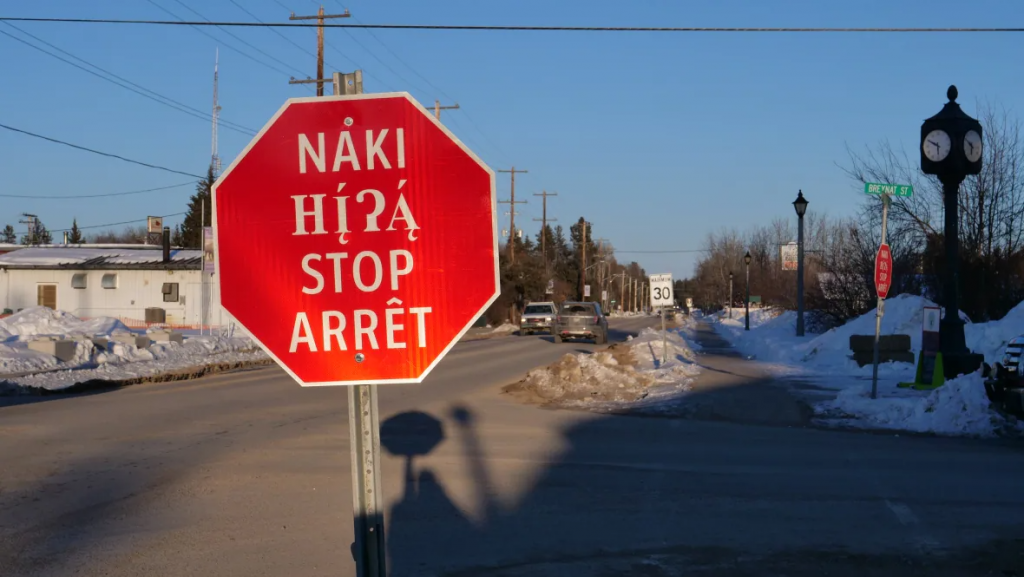Departments in Canada’s Northwest Territories failing to offer services in Indigenous languages, says commissioner

Services offered in English and French, but rarely in 9 official Indigenous languages
People should have the option to communicate with N.W.T. government’s departments in the nine official Indigenous languages on the phone — not just English and French — say language advocates and the territory’s official languages commissioner.
Brenda Gauthier, the N.W.T.’s languages commissioner, said Indigenous languages are absent from the territorial government’s services.
When residents seek out services in an official Indigenous language, government employees don’t know where to turn to ensure they can be served in their language of choice, she said during an annual report she delivered Thursday in a standing committee on government operations.
The committee is reviewing the Official Languages Act, as it is supposed to do every five years.
Lack of active offers
The act gives 11 languages equal status within all institutions of the N.W.T. government, but Gauthier said when you phone a territorial department, active offers — a recorded message that says you can communicate in a different language when you call an organization, for example — are only provided for French.
“The Francophone … Secretariat ensures this is done within the government institution by working with the departments at providing services,” said Gauthier.
Gauthier said the Indigenous Language and Education Secretariat’s mandate is to revitalize language.
She wants the secretariat to expand that mandate to include “service” and to work with territorial government departments like the Francophone Secretariat does to “ensure that Indigenous languages are being heard within these same institutions.”
Jessica Hval, a Cree language teacher at PWK High School in Fort Smith, said having those options on the phone would be helpful for her students.
There is a lot of work being done to make Cree, Chipewyan, French and English visible in her community, she said, but ensuring the languages are spoken would take things a step further.
“They’re not going to see the value in learning their language if it’s not in our society and daily life,” said Hval.
It’s a change Paul Boucher, who teaches Chipewyan at PWK High School, would like to see too.
“With the technology that we have today, we can do almost anything,” he said. “It’s just a matter of us working together and getting it done so that we have that option.”
Gauthier said she’s worked for the territorial government in various positions for more than 30 years, and when she hit her 25 year anniversary she asked to receive her long service award in Dene Zhatıé (South Slavey).
“I was asked to get my own translation done,” she said.
Indigenous languages face “glass ceiling,” says teacher
Gauthier said the person she reached out to did not ask to be paid for the translation work, but she doesn’t know if the government would have paid for the service if it was needed.
“This is the type of service that the [Government of the Northwest Territories] provided at that time. I’m not sure how much of an improvement has been made since,” she said.
Gauthier said one of the biggest issues is that government employees don’t know what they’re supposed to provide in the official languages, or where to turn to get direction.
She experienced that first hand as a government employee.
“We often asked, ‘What are we supposed to do when someone comes to us speaking another language, other than English?’ To add to this, we didn’t know where to take our concerns.”
Boucher said the Indigenous languages are “token” languages in the Official Languages Act. They are “below par” when compared to the implementation of English and French and face a “glass ceiling” which he believes needs to change.
“The languages in the North that are … recognized as official languages should be treated the same.”
Boucher said it’s “beautiful” to see how the education and health departments are bringing Indigenous languages into curriculums and services in Fort Smith, but other departments aren’t doing the same.
“They would say it’s optional and they don’t have to do it. I don’t think that’s fair.”
-With files from Laureen Laboret
Related stories from around the North:
Canada: Mark Indigenous languages decade by making Inuktitut official in Canada: Inuit UN rep, The Canadian Press
Finland: Everyone encouraged to boost Sami language visibility in Finland, Norway and Sweden this week, Eye on the Arctic
Norway: Indigenous and minority language names for Norway now have official status, The Independent Barents Observer
Russia: German project to house everything published in Siberian and Arctic languages to seek new funding, Eye on the Arctic
Sweden: Can cross-border cooperation help decolonize Sami-language education, Eye on the Arctic
United States: Inuit leaders applaud UN move to designate International Decade of Indigenous Languages, Eye on the Arctic



